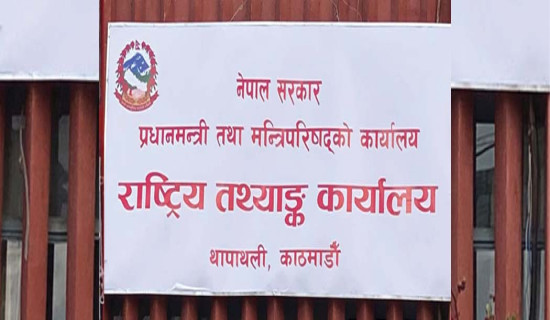- Friday, 30 January 2026
NRB’s flexible measures to boost economic activities continue
Kathmandu, May 18:Nepal Rastra Bank (NRB) has reviewed its third-quarter monetary policy for the current fiscal year 2023/24 giving continuity to the flexible measures adopted to accelerate economic activities.
The central bank reviewed the monetary policy on Friday. It said that the cautious and flexible course of action taken in the annual monetary policy has been continued based on the latest internal and external economic situation and scenario.
Through its review, the NRB has made easy arrangements for purchasing real estate. A flexible policy has been taken on debt service to gross income ratio to purchase real estate.
According to the bank, the Debt Service to Gross Income Ratio to purchase real estate will be increased from the existing 50 per cent to 70 per cent based on the submission of tax clearance payment.
After the implementation of this provision, those who buy real estate with a loan will be able to use up to 70 per cent of their income for instalment payments. Previously, only up to 50 per cent of the income could be paid this way.
The expected expansion in domestic demand has not been achieved due to the laxity in the real estate business, the problems seen in the cooperative sector, poor capital expenditure and a large number of youth flying overseas as migrant workers and students, it said.
“Due to these factors, the overall economic growth rate of Nepal is seen low,” said the NRB.
The National Statistics Office has estimated that the gross domestic product will expand by 3.87 per cent in the current fiscal year 2023/24.
Risk weightage on vehicle loan lowered
The central bank has reduced the risk weightage of higher purchase loans.
Through the third quarter review of monetary policy, the bank has mentioned that it will reduce the risk weightage on vehicle loans under hire purchase nature and maintain it at 100 per cent.
"The existing 125 per cent risk weightage on hire purchase vehicle loans provided by banks and financial institutions will be reduced to 100 per cent," said the NRB.
This will encourage banks to provide loans for vehicles.
NRB to facilitate strengthening capital fund of banks
The NRB has stated that necessary facilitation will be provided to bring additional tools into use to further strengthen the capital fund of banks and financial institutions.
In its third quarter review of the monetary policy, the bank has said that it will facilitate the use of alternative tools for capital fund management of BFIs.
Similarly, an easy policy has been taken to sell investments made by the banks.
"Banks and financial institutions will be allowed to sell up to 20 per cent of their primary capital in one fiscal year from the investments that have completed a year," said the NRB.
The existing loan loss provision for loans classified as a good category from the banks and financial institutions will be reduced from 1.25 per cent to 1.20 per cent.
The NRB has gradually reduced the loan loss provision for loans classified in the good category. Due to the increased risk after the COVID-19 pandemic, a policy was introduced that a 1.3 per cent loan loss should be arranged for the loans classified in the good category.
The central bank, which reduced it to 1.25 per cent last year, has further reduced it to 1.20 per cent through the third-quarter review of the current fiscal year's monetary policy.
The NRB has said that the existing arrangement regarding the import and sale of silver will be reviewed.
After the entrepreneurs of this sector made their request to review the provision regarding the import and sale of silver, the NRB decided to review the existing provision in this regard, said the NRB.
Policy rate, bank rate unchanged
According to the NRB, the policy rate, the deposit collection rate under the interest rate corridor and the bank rate have been kept unchanged based on the internal and external economic situations and scenarios.
The existing policy rate of 5.5 per cent, deposit collection rate under the interest rate corridor of 3 per cent and bank rate of 7 per cent have been kept unchanged.
Similarly, the existing mandatory cash reserve ratio and statutory liquidity ratio have remained unchanged.
To make the interest rate corridor effective, there will be a necessary review in the system of providing a standing deposit facility.
During the review period, the net surplus has increased significantly, but the monetary liquidity has increased due to the laxity in credit disbursement.
In the review period, the balance of payment surplus has increased significantly, but the monetary liquidity has increased due to the sluggish credit disbursement.
Interest rates on deposits and loans are decreasing as monetary policy is being made flexible, said the NRB and added that as the liquidity situation in the banking system is easy, the short-term and long-term interest rates have decreased.
Due to the slowdown in economic activity, loan recovery in the banking system has been affected and the non-performing loan ratio has increased.
By March 12, 2024, the average non-performing loans of banks and financial institutions reached 3.98 per cent of total loans.
Improved inflation
The inflation of the country has improved significantly in the nine months of the current fiscal year 2023/24.
According to NRB, as the average inflation rate for the nine months of the current fiscal year is 5.92 per cent, it seems that the annual average inflation will remain within the target range.
Although the pressure on the price situation has been decreasing since the beginning of the current fiscal year, there is still a risk of pressure on prices due to external factors.
Reasonable arrangements will be made while formulating the monetary policy for the fiscal year 2024/25 keeping in view the internal economic activity and inflation situation as well as the annual budget of the government of Nepal for the upcoming fiscal year.

















